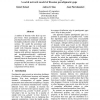Free Online Productivity Tools
i2Speak
i2Symbol
i2OCR
iTex2Img
iWeb2Print
iWeb2Shot
i2Type
iPdf2Split
iPdf2Merge
i2Bopomofo
i2Arabic
i2Style
i2Image
i2PDF
iLatex2Rtf
Sci2ools
ACL
2007
2007
Much ado about nothing: A social network model of Russian paradigmatic gaps
A number of Russian verbs lack 1sg nonpast forms. These paradigmatic gaps are puzzling because they seemingly contradict the highly productive nature of inflectional systems. We model the persistence and spread of Russian gaps via a multi-agent model with Bayesian learning. We ran three simulations: no grammar learning, learning with arbitrary analogical pressure, and morphophonologically conditioned learning. We compare the results to the attested historical development of the gaps. Contradicting previous accounts, we propose that the persistence of gaps can be explained in the absence of synchronic competition between forms.
| Added | 29 Oct 2010 |
| Updated | 29 Oct 2010 |
| Type | Conference |
| Year | 2007 |
| Where | ACL |
| Authors | Robert Daland, Andrea D. Sims, Janet Pierrehumbert |
Comments (0)

